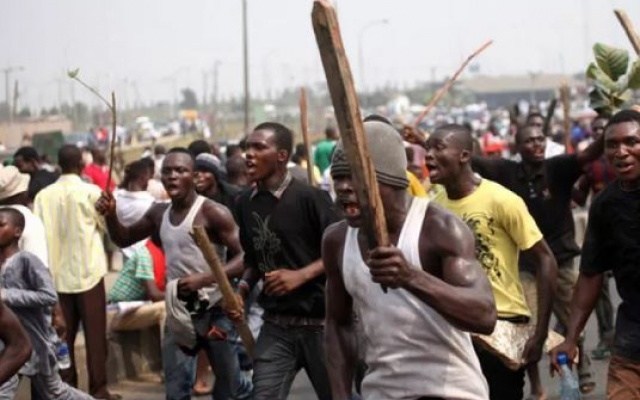The National Peace Council (NPC) has called on political parties, civil society organisations, and the media to sensitise the public on the “Roadmap to Eradicating Political Vigilantism” and sanctions against vigilantism acts.
Vigilantism is an act or threat of violence or intimidation undertaken by a person to further the interest of him or herself or another.
Reverend Dr Nii Amo Darko, the immediate past Board Member of the NPC, who made the call on Thursday at a day’s advocacy campaign programme on the eradication of vigilantism and related offences in Kasoa, said the “Vigilantism & Related Offences Act 2019 (Act 999)” was going to ‘bite' anyone or group which was found culpable.
The Act passed in 2019, states that a person shall not directly or indirectly form, organise, operate or promote the formation or operations of a vigilante group.
Any person who contravenes the provisions, including taking part in the activities of vigilante groups, commits an offense and would be liable on conviction to a term of imprisonment of not less than ten years and not more than 15 years.
The Act also holds anyone or group armed with an offensive weapon liable on conviction to a term of between 15 to 25 years imprisonment and such perpetrators would also be disqualified from holding public, political or political party office until at least ten years had elapsed from the date of conviction or after the end of the sentence.
Dr. Darko, who was speaking on the “Roadmap to Eradicating Political Vigilantism in Ghana,” said the NPC was monitoring to ensure that all political parties and stakeholders complied with the roadmap developed by the Council and stakeholders to promote peace and security before, during, and after the general election.
He explained that the roadmap identified specific actions and consequential tasks, some requiring advocacy, administrative remedies, and others in the form of legislative reform, and made recommendations to various stakeholders, including political parties, the Government, the National Commission for Civic Education, and the Electoral Commission.
Dr. Darko noted that the drivers of political party violence were many and fundamentally interrelated.
They include mistrust of Security Agencies and the Electoral Commission, mutual mistrust between the major political parties, the National Democratic Congress and the New Patriotic Party, political patronage, and the culture of rent-seeking, Ghana’s youth bulge and unemployment, and the ‘winner-takes-it-all’ politics.
To guide political parties to adhere to the directives of the roadmap, he said, a Code of Conduct was developed, which demanded that political parties publicly denounced any act of vigilantism when perpetrators were directly connected to their party, and encourage vigilante group leadership to disband such groups, among others.
Mr George Amoh, Executive Secretary of the NPC, said political parties had agreed to work within the structures proposed in the Code of Conduct, and through other lawful means, to ensure the eradication of political vigilantism in Ghana.
The greatest risk of electoral violence was political primaries, registration for voter cards, election of delegates, political debates, election campaign, election day, collation of results, declaration of results and transitional period, he said.
Mr. Michael Yaw Essuman Mensah, the Municipal Chief Executive of Awutu Senya East, said peace was priceless and could not be replaced.
Politicians, he said, did not think about repercussions of acts they indulged in just to attain power, adding that, it was unfortunate how they illegally employed the services of some poor youth to perpetuate their interests.
He said it was important that politicians became the starting point of the campaign against vigilantism and called on the media to support the worthy plan.
Some of the disbanded suspected vigilante groups are; Invincible Forces, Lions, Delta Force, Aluta Boys, The Rock, 66 Bench, NATO Forces, Bolga Bulldogs, The Crocodiles, Aluta Boys, Rasta Boys, Pentagon, Al Qaeda, Sese Group, The Dragons, Taliban Boys, Tohazie, and Asamankese Forces.
The rest are; Azorka Boys, Kandahar Boys, Baafira, Burma Camp, Bukurisung, Gbewaa Youth, Eastern Members, and the Hawks.
Latest Stories
-
Joy FM listeners criticise Achiase Commanding Officer’s election comment
7 mins -
Legal Aid Commission employees threaten strike over poor working conditions
10 mins -
Ghana ranked 7th globally as biggest beneficiary of World Bank funding
20 mins -
IMF board to disburse $360m to Ghana in December after third review
24 mins -
Former Bono Regional NPP organiser donates 13 motorbikes to 12 constituencies
30 mins -
Securities industry: Assets under management estimated at GH¢81.7bn in quarter 3, 2024
35 mins -
Gold Fields Ghana Foundation challenges graduates to maximise benefits of community apprenticeship programme
2 hours -
GBC accuses Deputy Information Minister Sylvester Tetteh of demolishing its bungalow illegally
2 hours -
Boost for education as government commissions 80 projects
2 hours -
NAPO commissions library to honour Atta-Mills’ memory
3 hours -
OmniBSIC Bank champions health and wellness with thriving community walk
3 hours -
Kora Wearables unveils Neo: The Ultimate Smartwatch for Ghana’s tech-savvy and health-conscious users
3 hours -
NDC supports Dampare’s ‘no guns at polling stations’ directive
3 hours -
Police officer interdicted after video of assault goes viral
3 hours -
KNUST’s Prof. Reginald Annan named first African recipient of World Cancer Research Fund
3 hours

